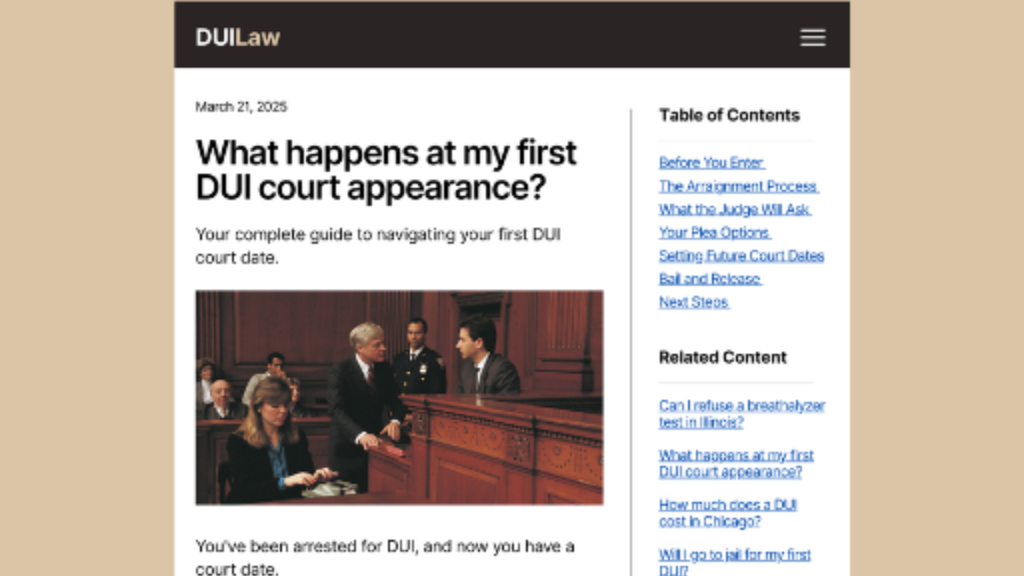Introduction
Ranking for question-based searches with educational content is a great way for criminal defense firms to get even more leads from their existing SEO efforts.
But many successful defense firms are still heavily investing in transactional searches like "DUI lawyer Chicago" while completely ignoring the question-based searches that get 10x more volume.
They either don't realize this is a lucrative opportunity, get overwhelmed by the resources required to create 70+ articles, or don't have the specialized expertise needed to execute it properly.
Creating articles that answer real questions scared prospects are Googling at 2 AM doesn't have to be overwhelming or too technical.
In this article, we'll show you exactly how to use educational articles to dominate question-based searches and generate more qualified leads in addition to what you're already getting from traditional attorney searches.
Here's what we'll cover:
- What kinds of searches do people make when they get arrested?
- What are educational articles and how do they capture these searches?
- Why should criminal defense firms invest in educational articles for question-based searches?
- What's the real business value and ROI of educational articles?
- How do Google and AI search engines decide which content to show first?
- Your step-by-step plan for dominating question-based searches
What Kinds of Searches Do People Make When They Get Arrested?
There are two main types of searches people make after getting arrested - and understanding the difference is crucial for capturing prospects at the right time.
First: Question-based searches
These look like actual questions people ask when they're scared and confused:
- "What happens if I get a DUI in Cook County, Illinois?"
- "Can I fight drug possession charges in California?"
- "What are penalties for domestic violence in Texas?"
- "Will I go to jail for assault charges in Florida?"
- "What happens at a DUI arraignment?"
- "Can I refuse a breathalyzer test?"
People make these searches immediately after getting arrested when they're nervous, stressed, and have racing questions about their situation. They're probably sitting at home at 2 AM, unable to sleep, frantically Googling to understand what's happening to them and what consequences they're facing.
They're not ready to hire a lawyer yet - they're just trying to make sense of their legal predicament and calm their fears.
Second: Transactional searches
These look like someone actively shopping for legal services:
- "DUI lawyer near me"
- "Chicago criminal defense attorney"
- "Best drug crime lawyer in California"
- "Domestic violence attorney Texas"
- "Criminal defense lawyer reviews"
People search these terms when they've already decided they need a lawyer and are ready to start calling firms. They've done their research, understand their situation, and now they're looking to hire someone.
What Are Educational Articles and How Do They Capture These Searches?
Criminal defense firms create two different types of pages to capture these different search behaviors.
Transactional pages target attorney searches
These are the traditional service pages most firms focus on:
- "Chicago DUI Lawyer"
- "Criminal Defense Attorney"
- "Drug Crime Lawyer"
- "Why Choose Our Firm"
- "Our Results"
These pages are designed to convince someone who's already decided they need a lawyer to hire your firm specifically. They talk about your experience, results, and why you're better than competitors.
Educational articles target question-based searches
These are completely different - they answer specific questions prospects are asking:
- "What Happens at a DUI Hearing in Illinois?"
- "Can You Fight Drug Possession Charges?"
- "Penalties for First-Time Domestic Violence in Texas"
- "Will I Go to Jail for Assault?"
- "What to Expect During a Criminal Trial"
Educational articles don't try to sell your services directly. Instead, they provide genuinely helpful information that scared prospects need during their research phase. The goal is to position you as the knowledgeable expert who understands their situation.
The key difference: Transactional pages say "hire us," while educational articles say "let us help you understand what you're going through."
Both types of pages are absolutely essential for a successful criminal defense practice, but they serve very different purposes and target prospects at different stages of their journey. When someone finds your detailed article explaining exactly what happens with their specific charge, you become the attorney who helped them during their worst moment - making you the obvious choice when they're ready to hire.
Do Educational Articles That Target Questions Drive Leads?
Yes, but they work very differently than transactional pages - and often more effectively for building long-term client relationships.
Educational articles don't generate immediate phone calls like a "DUI Lawyer Chicago" page might. Instead, they build trust over time with prospects who aren't ready to hire yet. Someone reading your article about "What Happens at a DUI Hearing" probably won't call you that same day, but they'll remember you as the attorney who helped them understand their situation.
Here's how educational articles actually convert:
- Multiple touchpoints - Prospects often read 3-5 of your articles before calling, building trust with each interaction
- Delayed conversions - Someone might read your article today, bookmark your site, then call you weeks later when they're ready to hire
- Pre-qualified leads - By the time they contact you, they already understand their situation and respect your expertise
- Higher quality prospects - These clients convert 25% higher than cold traffic because they already trust you
The attribution problem: Your analytics might show someone converted through your "Contact Us" page or called directly, but they actually discovered you through an educational article first. The educational content did all the heavy lifting to build trust, even though it doesn't get credit for the conversion.
Educational articles work like planting seeds - you don't see immediate results, but over time they grow into a steady stream of prospects who already know, like, and trust you before they ever pick up the phone.
The prospects who find you through educational content become your best clients because they're informed, have realistic expectations, and view you as the expert who helped them through their worst moment.
Why Should Criminal Defense Firms Invest in Educational Articles?
Educational articles completely flip the competitive landscape by letting you dominate searches your competitors don't even know exist.
Here's the reality most firms miss: for every person searching "DUI lawyer near me," there are 10-20 people asking questions like "What happens if I refuse a breathalyzer?" or "Can I get a DUI dismissed?" These folks aren't ready to hire yet - they're scared, confused, and trying to figure out what's happening to them. Most defense firms completely ignore these people, don't answer many questions their prospects are asking, and lose them to competitors who actually provide helpful answers.
Educational articles give you three major advantages:
- You catch prospects during their research phase - Someone arrested for DUI will spend days researching before hiring anyone. When you answer their questions during this phase, you become the obvious choice when they're ready to hire.
- You compete against way fewer firms - While 50+ attorneys fight over "DUI lawyer Chicago," maybe 2-3 firms answer "What happens at a DUI arraignment?" You can dominate these searches because nobody else is trying.
- You get higher-quality clients - People who found you through educational content already trust your expertise and have realistic expectations. They convert 25% higher than cold traffic and respect your knowledge from day one.
Educational articles turn you from "just another lawyer" into "the lawyer who helped me understand what was happening" - exactly the positioning that wins more cases and better clients.
What's the Real Business Value of Educational Articles?
The ROI of educational articles often surprises defense attorneys who see the actual numbers.
Let's walk through a realistic example: Say you're a mid-sized defense firm getting 20 DUI cases per month at $3,500 each - that's $70,000 in monthly DUI revenue. After implementing educational articles targeting question-based searches, you start capturing traffic from 15,000+ monthly searches instead of competing for just 1,000 "DUI lawyer Chicago" searches. You begin pulling cases from surrounding counties because people find your educational content first.
Real numbers from this scenario:
- Before: 20 cases/month × $3,500 = $70,000/month
- After: 35 cases/month × $3,500 = $122,500/month
- Additional revenue: $52,500/month or $630,000 annually
Those educational articles keep working 24/7 for years. A single well-ranking article can bring in 2-3 cases per month indefinitely, like having a salesperson who never sleeps and never asks for a raise.
The investment to create this content is typically a fraction of what firms spend on monthly advertising, but it delivers compounding results that improve year after year instead of stopping the moment you quit paying.
Why Don't Defense Firms Try to Rank for Question Searches More Often?
Most law firms miss the question-search opportunity for three understandable but ultimately fixable reasons.
The biggest problem is measurement - firms look at their analytics and see that "DUI lawyer near me" converts at 15% while "What happens if you get a DUI" converts at 2%. They think educational content doesn't work. But they're missing the bigger picture: that 2% conversion rate comes from 10x more traffic, and those educational visitors often return later through other channels without proper attribution in their tracking.
The other major barriers include:
- Time constraints - Writing 70+ legally accurate articles optimized for search takes months of work for attorneys already billing 60+ hours per week. Most firms start with good intentions, create maybe 5 articles, then abandon the project when daily demands take over.
- Expertise gaps - You need someone who understands both SEO and criminal defense law fluently. Most attorneys can write about law but don't understand keyword research or search optimization. Most SEO professionals don't understand legal nuances well enough to write authoritative content that builds trust.
It's like needing someone bilingual in two completely different languages - a rare combination that explains why most firms either don't attempt this strategy or execute it poorly.
The firms that succeed either invest the significant time and money required to do this properly, or they find solutions that eliminate these barriers entirely.
How Does Google Decide Which Articles to Show First in Search Results?
Google's ranking algorithm prioritizes websites that provide the most helpful, accurate answers to searchers' questions.
For defense firms, several factors matter most in determining who ranks first. Content quality and relevance top the list - if someone searches "What happens at a DUI hearing?" Google wants to show the most thorough, understandable explanation available. Authority and trust signals also matter significantly: how long your website has existed, how many reputable sites link to you, and whether you cite credible sources all influence your rankings.
User behavior sends the strongest ranking signals:
- Time on page - When people click your article and actually read it instead of immediately hitting back, Google notices
- Engagement metrics - Articles that keep people engaged signal valuable content worth ranking higher
- Return visits - Prospects who bookmark your content and return later demonstrate trust and authority
Technical factors matter too - your site must load quickly, work perfectly on mobile devices, and provide smooth navigation. Google won't rank sites that frustrate users regardless of content quality.
The key insight is that Google's job is giving people the best possible answer to their question. When defense firms create genuinely helpful content that answers real questions prospects have, Google rewards that by showing it to more people - it's about being genuinely helpful, not gaming the system.
How Do AI Search Engines Decide Which Information to Show?
AI search engines like ChatGPT, Claude, and Gemini work differently than Google but reward the same type of high-quality educational content.
When someone asks ChatGPT "What happens if I get a DUI?", it searches for comprehensive, accurate information from credible sources. Well-written legal articles from actual law firms often get referenced because AI systems recognize them as authoritative and trustworthy. AI models particularly value clear, detailed explanations that break down complex topics into understandable pieces.
AI search engines prioritize:
- Recent, jurisdiction-specific information - An article about "DUI laws in Illinois 2024" ranks higher than generic content from 2018
- Comprehensive coverage - Content covering the full spectrum of related questions gets referenced more often throughout conversations
- Source aggregation - AI doesn't copy one source but pulls from multiple articles, often citing the most comprehensive resources for "learn more" suggestions
Unlike Google searches that end after one query, AI conversations continue with follow-up questions. If your firm has educational content covering related topics like "What about first-time offenders?" or "How much will this cost?", you're more likely to get mentioned throughout the entire conversation.
Defense attorneys with strong educational content get referenced more often because they're providing genuine value that AI systems recognize and recommend to users seeking legal information.
How to Dominate Question-Based Searches: Your Step-by-Step Strategy
Dominating question-based searches requires a systematic approach that most firms attempt randomly and fail to execute properly.
Step 1: Define your ideal client profile (ICP)
Get super specific - what practice area, what type of charge, what geographic area? "DUI clients in Cook County" is way better than "criminal defense clients." The more specific you are, the better you can target content.
Step 2: Set a clear lead goal
Define exactly what success looks like: "Generate 15 qualified DUI leads per month by month 6." A qualified lead is someone who calls or fills out a form with a real case in your practice area and geographic region - not just random website visitors.
Step 3: Generate a massive keyword list
Use AI tools, AnswerThePublic, or just brainstorm every question prospects might ask. Think seed keywords ("DUI"), short phrases ("DUI penalties"), and full questions ("What happens at a DUI hearing?"). Aim for 1,000+ keywords - more is better at this stage.
Step 4: Get real search data
Plug those keywords into Google Keyword Planner or SEMrush to see actual search volumes. Filter out anything with less than 50 monthly searches - you want keywords people are actually searching for.
Step 5: Analyze market share distribution
Look at the total monthly searches across all your target keywords. If there are 23,000 monthly searches total, figure out how many each competitor captures versus you. This shows you the real opportunity size.
Step 6: Set your search market share goal
"Increase our share from 5% to 25% of total searches in our practice area" or "Grow from 500 to 3,000 monthly organic visitors." Make it measurable.
Step 7: Create your content strategy
For each keyword, check what competitors have written. Note what they covered well and what they missed. Use this to find content gaps you can fill better.
Step 8: Create content briefs and articles
Write comprehensive articles that fill those gaps. Make sure every article links back to your relevant service pages - this is crucial for conversions.
Step 9: Publish consistently
Try to publish 1-2 articles per day if possible. Consistency beats perfection here.
The key: Most firms try to do this randomly. This systematic approach ensures you're targeting the right keywords and creating content that actually drives business results.
Conclusion
Educational articles represent an underrated opportunity in criminal defense marketing today.
While most firms fight over increasingly expensive attorney searches, question-based searches offer a clear path to market dominance with significantly less competition. The prospects you capture during their research phase become the highest-quality clients - informed, realistic, and already trusting your expertise before they ever call.
The business case is compelling: firms implementing comprehensive educational content strategies typically see increases in qualified leads within months. More importantly, these results compound year after year as your content library continues ranking and capturing prospects while competitors exhaust their advertising budgets fighting over the same limited searches.
The choice facing successful defense firms is simple - continue competing with 50+ firms for transactional searches, or start dominating the educational searches that represent more opportunity with a fraction of the competition.
The firms that act on this insight first will build unshakeable market positions that become increasingly difficult for competitors to challenge. The question isn't whether educational articles work - it's whether you'll implement them before your competitors discover this opportunity.

.webp)

